A number of years ago I noticed for the first time that moment in King Lear when Shakespeare, having apparently just noticed Goneril and Regan were a lot more sympathetic than their father King Lear, provided the sisters with what I think of as “Have I mentioned today that I am evil” dialogue to inform the audience that Lear somehow wasn’t the worst person in the play. Similarly, Falcon and the Winter Soldier writers appear to have belatedly noticed that series antagonist Karli Morgenthau and her Flag Smashers followed a cause likely to strike a chord with viewers—thus the out-of-character atrocity Morgenthau commits to ensure that as problematic as the protagonists might be, their opponents are, however implausibly, worse.
One could, of course, make the good guys better from the get-go. However, a third alternative to very bad bad guys and better good guys exists, which is to accept that some antagonists can be surprisingly relatable…sometimes even endearing. This even (perhaps especially) extends to that specific variety of antagonist known as the supervillain. Here are five such, from least villainous to most.
Bad Penny (Please Don’t Tell My Parents I’m a Supervillain by Richard Roberts)
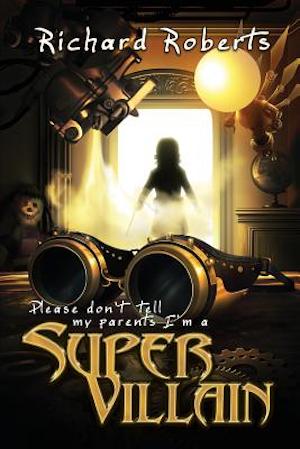
Child of superheroes the Audit and Brainy Akk, Penelope “Penny” Akk is a brilliant and talented teen. Additionally, her fugue-state creations are marvels of super-science. Pity she cannot always remember what her inventions do. Despite plans to follow in her parents’ footsteps, mistakes are made and first impressions are poor. As far as the public (and more importantly, the superhero community to which her parents belong) are concerned, Penny and her enhanced friends are Bad Penny, E‑Claire, and Reviled, the city’s newest supervillains.
Penny and her friends’ actions are open to a variety of interpretations. Her maniacal laugh (“HA! AH HA HA HA HA HA HA!”) may also be a PR issue, although I note DC’s the Creeper manages to be accepted as a hero despite a similar chortle. However, in what will be a running theme, she’s the viewpoint character so the reader knows Penny means well and isn’t malicious. If only there was some way to convey that to her parents and their coworkers without being grounded for life.
Rex (The Meister of Decimen City by Brenna Raney)
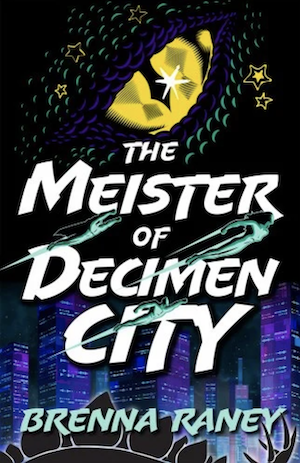
Rex balances prodigious and wide-ranging genius with equally prodigious and wide-ranging vulnerabilities. For one thing, vast swaths of human behavior are a mystery that her brilliance has yet to unravel. For another, Rex habitually assumes that what she hopes to achieve will be what she gets. She is the poster child for unforeseen consequences, and the reason Decimen City had, for example, a cloned dinosaur problem.
If one measures villainy by the tendency to produce existential threats to the human race, then Rex undoubtedly qualifies. She is personally responsible for at least three such threats. However, her intentions are good, some of her inventions (like the cure for cancer) are globally beneficial…and yet again, she is the protagonist. The reader gets an informed insight into the thought processes leading up to conclusions such as “what this city needs is a small horde of genetically engineered dinosaurs.” It is very easy for a reader to conclude Rex isn’t really a villain so much as a person in dire need of a full-time babysitter.1
Anna Tromedlov (Hench by Natalie Zina Walschots)
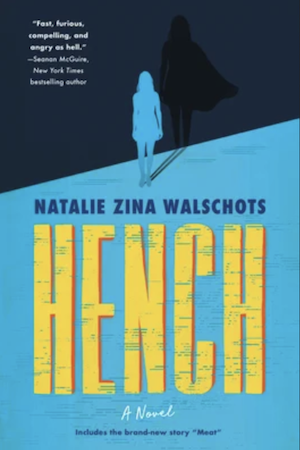
Simple economic reality forces Anna to work as a temp henchperson for supervillains. Supposed hero Supercollider’s callousness regarding collateral damage lands a badly injured Anna in the hospital. This is why Anna decides to leave the world of hench gigs behind for a management role. Anna will apply her skills at social engineering to send supposed heroes like Supercollider into oblivion…which is to say, she becomes a supervillain.
To be honest, I am not swayed by some of Anna’s anti-hero logic, because it seems to ignore the toll imposed on bystanders by her former bosses.2 However, she is adept at focusing her efforts on her targets, rather than handwaving away collateral damage as minor externalities. Again, it helps that she is the protagonist.
Cas Russell (Zero Sum Game by S. L. Huang)
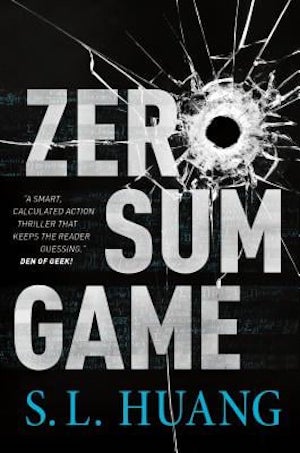
Cas lives in a world in which a few people have superficially plausible enhanced abilities. In Cas’ case, that would be the power to do complex calculations at superhuman speed and use those calculations to solve real-world problems. Hence she is a superlative gymnast, can evade gunfire and assailants, and almost never misses when she attacks. Proof: the trail of dead bodies she has left in her wake.
Cas accepts dubious assignments from bad people and is quite nonchalant about murdering people. The main reason she isn’t labeled a supervillain is because very few people know that such enhanced beings exist at all, let alone know enough to label them. Moreover, Cas keeps a low profile.
If confronted and taxed with her actions, Cas would argue that she is merely being pragmatic. The narrative makes it clear that what she is, fundamentally, is broken. Cas does belatedly resolve to be a better person, a significant point in her favor. Good thing for Cas that there are so many ways in which she can improve. Success is almost ensured!
Dr. Impossible (Soon I Will Be Invincible) by Austin Grossman
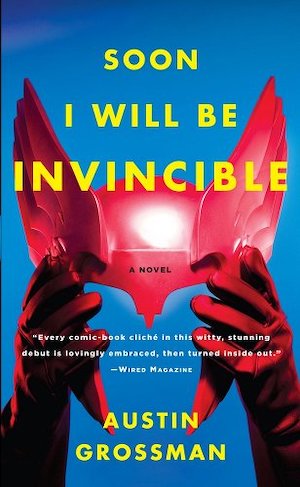
It cannot be denied that Soon I Will Be Invincible’s Dr. Impossible is a vexing person with whom to share a planet. His determination to conquer Earth leads to a variety of ingenious schemes, each as disruptive as they are doomed to failure. When circumstances provide him with escape from the latest prison in which he has been penned, he immediately sets out to reprise the essential error that always lands him back in the hoosegow: the attempt to prove that he is the best by crushing all before him.
Grossman’s character has three factors working in his favor.
1) Impossible has what seems to be a recognized medical condition driving his compulsive behavior: malign hypercognition syndrome. What he doesn’t seem to have found is any sort of effective treatment for it.
2) He does avoid hurting bystanders directly.3
3) Finally, he is one of the two viewpoint characters. Thus, events are presented from his unique perspective. Once again we see that being the person who tells the story is very handy when it comes to PR.
***
These are only a few of the sympathetic villains I could have named. No doubt many of you have favorites overlooked above. Feel free to advocate for them in comments, which are, as ever, below.
In the words of fanfiction author Musty181, four-time Hugo finalist, prolific book reviewer, and perennial Darwin Award nominee James Davis Nicoll “looks like a default mii with glasses.” His work has appeared in Interzone, Publishers Weekly and Romantic Times as well as on his own websites, James Nicoll Reviews (where he is assisted by editor Karen Lofstrom and web person Adrienne L. Travis) and the 2021, 2022, and 2023 Aurora Award finalist Young People Read Old SFF (where he is assisted by web person Adrienne L. Travis). His Patreon can be found here.
[1]Rex does have babysitters of a sort: her faithful lawyer and her AI. Too bad that they cannot stop her ill-starred escapades; they merely help her get away with them. This is why Decimen City tends to see her as a loveable if ditzy genius rather than Dr. Oh God What Now?!
[2]I don’t think we are given any villain body counts at all, which makes it is impossible to assess whether the cure (superhero) is worse than the disease (supervillain).
[3]Some of Dr. Impossible’s schemes would indirectly kill billions of innocent people. Not wanting to kill people directly doesn’t make him much of a good guy. He’s just squeamish.










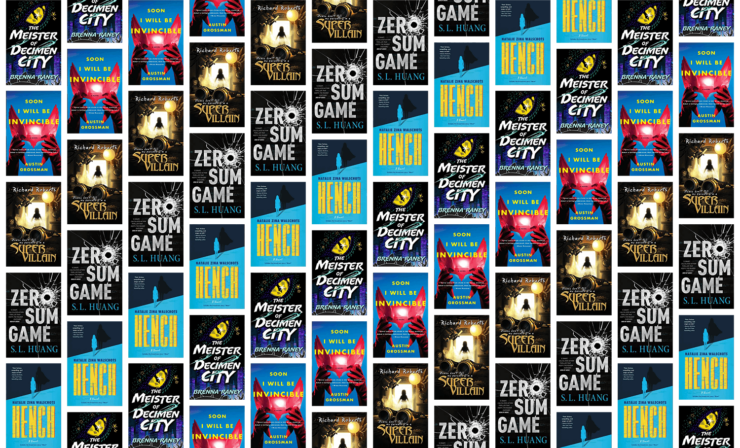
The movie Megamind does this almost to perfection. A large-headed alien child is sent away from his cataclysmic home planet at the same time as another child from a similarly doomed planet. One gets inhuman strength, speed, looks, and powers — while the other is gangly, blue, and beset by discrimination because of his appearance and difficulty communicating. Blue is constantly trying to show he can be just as friendly as the boy for whom everything comes easy, and is roundly criticized for even trying. So, if Golden Boy is good — he must be the opposite.
While not the stated intention of the creators, it shows the results of a society where nonconformity is punished to excess. I feel a strong connection to Megamind, having been teased constantly as a child and growing up with undiagnosed Asperger’s. He is very much me, but with a propensity to enact his revenge schemes. I sometimes wonder about the horrific crimes on the news and think, “Gee, I wonder if anyone was nice to them when they were a child? Maybe having a friend to play with instead of a composition book with knives drawn in it could have changed things.”
Soon I Will be Invincible is perhaps the greatest behind the scenes super book. Doc gatecrashes a meeting of other baddies. But, whereas other stories just have protagonists appear, Doc has to find some bushes to change into his costume.
ISTR that Lanfear did it all for love. What’s not sympathetic about that.
2: Decades of playing tabletop superhero roleplaying games has convinced me of the utility of instant-change.
3: My last set of antagonists in Dragonbane were undead Romeo and necromancer Juliet, acting on the advice of a demon who really was only trying to help out. Honest. Now the PCs are stuck with a demon in an amulet that they cannot get rid of, who plans to be an endless font of advice.
I’m quite fond of Doctor Horrible, the small-time supervillain of Dr. Horrible’s Sing-Along Blog who just wants to build a freeze ray, earn a modest crust and become a member of the Evil League of Evil. In both he’s repeatedly thwarted by Captain Hammer, a “hero” who probably can’t even spell the phrase “collateral damage” let alone understand it, and this escalates alarmingly. This leads to a tragedy that ensures his entry into the ELofE, destroys most of his reasons to hold back, and bodes ill for the world.
https://en.wikipedia.org/wiki/Dr._Horrible%27s_Sing-Along_Blog
My read of Hench was that Anna was well and truly off her rocker by the end and that we were not at all supposed to sympathize with her.
Surely nobody who uses math could be unhinged?
Looking at the numbers in Hench, I feel that Anna’s calculations are off. In her calculations of the first battle, she puts everything that happens after the hero’s enter the room on their side. Despite the fact that one the deaths was a henchman firing at the hero’s a hitting a fellow henchmen.
Even with her own injury, she blames Supercollider and not the fact that she was a percipient and assisting in terrorism, torture, and mutilation.
She also never really looks at how the villains that hire her make their money.
I would agree with Perene that Anna is off her rocker.
That said, who doesn’t love a villainous origin story? Her grievances don’t have to make sense. Hench is a really fun book from the other side.
For sympathetic supervillains I always go to Taylor Hebert AKA “Skitter” from Worm.
She’s a powerless and abused 15 year old that just wants to fix the world. And then… she gets the power to do so. As the tagline for the story goes, “The Road to Hell is Paved with Good Intentions.”
The anime Miss Kuroitsu from the Monster Development Department has the nicest evil bad guy organization ever: Agastia! They are the opposite of a corporate black company, the ones that make their workers put in 60-80 hours a week. Agastia is portrayed so nicely, many viewers wished that they worked for them! Yes their overall goal is World Conquest, but considering how they go out of their way to protect innocent bystanders and keep property damage down, would it be so bad if they did take over the world? (Shades of Mojo Jojo succeeding and turning out to be a benevolent ruler…)
Comics (and especially the Marvel stable) are particularly rife with villains whose motivations we can sympathize with, even as we deplore their actions.
Dr Doom genuinely believes that the only way to save the world is for him to rule it. Evidence suggests that he is in fact a benevolent ruler, loved by the people of Latveria. (Note that this may have changed in recent decades; I stopped buying comics for a variety of reasons around ’92.)
Magneto, having survived one genocide, is certain that anti-mutant sentiment is another (and he isn’t exactly wrong); he will do anything necessary to prevent it.
Thanos, in the comics, does it all for love. It’s just that the one he loves happens to be the incarnation of Death.
Over at D.C., I gather that some recent iterations of Lex Luthor — aside from believing that Superman’s powers-and-abilities have kept him from being the most-honored person on earth — honestly believes that the big blue boy scout has actually prevented humans from … something great (it’s a little unclear to me just what that something is supposed to be).
Fred Saberhagen’s The Dracula Tapes is an interesting look at the events from another point of view.
@10 In the 70s prose novel, Superman: Last Son of Krypton, Luthor patiently explains to Superman, in the context of a temporary alliance against an alien conqueror, that the juxtaposition of human social development and rapid tech advancement is unique in the galaxy. Properly harnessed, it would allow Earth to be a dominant interstellar player.
Superman asks, if that’s true, why Lex hasn’t taken advantage of it. Luthor is genuinely floored: “What did you *think* you’d been stopping me from doing all these years?”
That Lex (from the open criminal rather than businessman era) is a reasonably decent boss, if prone to fits of anger at how slow everyone around him is.
There’s another sympathetic take on Lex Luthor in Alexander Wales’s Metropolitan Man (https://www.fanfiction.net/s/10360716/1/The-Metropolitan-Man). He’s defending Earth against an alien invader with unknown goals (i.e. Superman).
@10
The relation Doom has to the people of Latveria is highly depending on the individual author’s take
It runs from “loved as he is totally benevolent and has raised them from poverty” all the way to “hated and feared but nobody dares to act against him due to the secret police with Doom level technlogy”
Considering the number of people who many of his schemes would kill the second seems a little more plausible than the first
In She-Ra, Princess of Power, Hordak and his lieutenant Catra have fairly understandable, even poingent goals. Ubeqnx vf n qrsrpgvir pybar bs gur bevtvany, havirefr pbadhrevat Ubeqnx, nppvqragnyyl rkvyrq gb n cbpxrg havirefr. Ur znvayl jnagf gb tb ubzr naq or npprcgrq. Pngen unf n jnecrq hcoevatvat nf n puvyq fbyqvre, naq na vagrafr, haerpbtavmrq ybir sbe Nqben/Fur-En. Fur vf qevira gb frys-qrfgehpgvir yratguf ol vg.
I found myself rooting for them personally, if not for them to actually succeed.
I haven’t read any of these books yet (although a few are included in my own Mount Tsundoku), but I feel the need to applaud the article’s opening sentence. That scene is egregious.
Adam Warren’s wonderful manga-inspired “Empowered” comics series from Dark Horse does interesting things with supervillains (as it also does with superheroes, not least the title character). Emp’s boyfriend, Thugboy, is – as the name implies – a reformed henchman. One of the other main supporting characters, the Caged Demonwolf, is a cosmic menace now trapped in a belt and residing on a table in Emp’s apartment, watching TV, listening to radio and conversing in OTT supervillain dialogue. In one volume, Emp grants a terminally-ill child his special wish – he wanted to grow up to become a supervillain, and Emp allows him to tie her up (there are a _lot_ of bondage jokes in the series – that was one of its original inspirations); later he manages to survive, achieves his villainous ambition, but comes to Emp’s rescue out of gratitude. All in all, one of my favourite comics series of the last couple of decades, and certainly the funniest.
Leto in God Emperor of Dune is arguably a supervillain. Certainly a Monster. And definitely someone you don’t want to get too close to.
tonyz@11 The rest of Sabehagen’s Dracula series is pretty good too. I especially like the Sherlock Holmes crossover
Not quite SFF but the star of the book Wicked is a classic example of a sympathetic villain – especially where she doesn’t want to be a villain.
Not done intentionally, but shifting social perceptions over the decades have done this to a number of Batman villains; notably Catwoman (steals from billionaires), Poison Ivy (believes that modern industry and capitalism are destroying nature), and Harley Quinn (who has gone from an amusingly-abused-girlfriend to a full-on anti-hero and feminist icon).
(Conversely, Batman being a trust-fund billionaire who beats up desperate poor people hasn’t really aged well.)
Also one of the Clayfaces (it’s complicated) has swerved toward being a good person, the Riddler has had episodes of working as a legit P.I. (before writers force him back to the status quo), and Killer Croc. . . is still a cannibalistic serial killer, but also explicitly protects children (part of his villainous origin story is that he was physically/emotionally abused as a child, and he is not going to let that happen to others).
I’m pretty sure it would be difficult to find scenes of Batman beating up “desperate poor people”. His villains tend to be well enough resourced to acquire gadgets, uniforms, and elaborate lairs, and their henchmen are generally either fanatics or earning a heck of a risk premium. (In addition to generally being in the process of mayhem that would justify a self defense or defense of others defense regardless of income.)
His villains also generally compromise audience sympathy with a bunch of mass murder, though Selina and more recently Harley are sometimes exceptions. (Often as part of a face turn.)
I haven’t read this recently enough to remember if the protagonist in this would actually qualify as a supervillain but he was sympathetic (and entertaining): I am a Genius of Unspeakable Evil and I Want to Be Your Class President by Josh Lieb
@6 Wow, perhaps I missed something when I read Hench. I found Anna relatable and sympathetic if a bit too bloodthirsty/ obsessed by the end. (I didn’t like her leaving the Meat behind after the Glassblower incident. And near the end, when she said everything be worth it so long as she saved Leviathan, I had to disagree. Someone as good at data analysis as her should understand the concept of sunk costs.) I wouldn’t call her crazy though. Just that her perception has been distorted by revenge. Hardly different from the folks who loved superheroes letting their perception be distorted by admiration.
@8 Good point! She should have looked at the costs of supervillains on society as well. I disagree with labeling her an accessory to terrorism though. Terrorist is an overused insult. That one character, the head of the supervillain’s security– he used to work for (I think it was a military organization, but I’m not certain). He said it was the same thing to him, killing people and committing atrocities. I don’t know if I agree, but it’s chilling to consider other perspectives.
Is office work for supervillains really different from office work for evil corporations? Anna didn’t know her boss was kidnapping a teenager until they dragged him in. Is ignorance an excuse? Lots of people are ignorant of lots of atrocities. Is compliance a crime? Is being a bystander a crime? Is economic hardship a factor in this equation? I don’t think the book offers easy answers to these questions, it just makes people ask them and think.
@1 I need to re-watch that movie; I liked it and found Megamind very relatable. (Except the wanting to take over part. And the mass destruction part.) Didn’t like how the antagonist was a nerd/ geek stereotype though.
@19 Yes!! I loved Wicked, I haven’t seen it in far too long. I should read the book someday, too…
@19 — what do you mean Wicked isn’t SFF? It’s definitely fantasy, starting with the sapient talking Animals.
I’m surprised that Victor Vale from V. E. Schwab’s Vicious hasn’t been mentioned. I found him far more sympathetic than Eli, and really love these two lines:
“If Eli really was a hero, and Victor meant to stop him, did that make him a villain? He took a long sip of his drink, tipped his head back against the couch, and decided he could live with that.”
@23
You aren’t in love with Leviathan. Many people who are in love have made the same evaluation she did, often to their and others’ great detriment.
Conversely, Batman being a trust-fund billionaire who beats up desperate poor people hasn’t really aged well.
Perhaps you might share an example of Batman beating up a desperate poor person? In comics, movies, animations, TV series, novelty T-shirts, I’m not fussy. Just one would do. I’ve noticed that people who make this argument on Twitter are never able to come up with examples, but I think the standard of conversation here is rather better, so I’m sure you’ll be able to.
Because, as 21 rightly says, his most famous antagonists are generally very well-funded and capable and often have large organisations behind their plans to steal vast sums of money, overthrow governments or kill huge numbers of people. Are we really seeing Ras Al-Ghul and the Penguin as desperately poor marginalised people? The Penguin can afford to buy his own nuclear submarine!
Also, Batman isn’t a trust-fund billionaire. He is a billionaire. His money comes from Wayne Enterprises, which he owns.
@24 – true dat!
@27. I was thinking more of the henchmen. While the ones who work for the mobs or Black Mask or Penguin are probably well-paid (though I wouldn’t put it past Oswald or the Maronis to stiff people on their hospital bills and/or legal fees), and the Court of Owls or the League of Shadows are fanatics, most of the thugs that Batman mows down to get to Joker or Mr. Freeze or Hugo Strange or the Royal Flush Gang are probably lower-income people from the Narrows who desperately need the money and have no choice but to turn to crime. Crime, as Don Falcone would say, is a business, and like all businesses, it relies on the minimum-wage employees.
(And grad students. A curious number of Gotham villains have doctorates, and someone probably offers course credit.)
It’s that old argument that Bruce could do more with community outreach (assuming the whole system wasn’t corrupt, and that donations to charity/education/infrastructure could actually reach the people who need it) –though it could also explain the escalation we tend to see in Batman stories: the street-level gangs and carjackers start to disappear after a few years (as Wayne Charities quietly addresses social issues), making room for the well-dressed mobsters and armed cultists who are laser-focused on the Bat.
Different comic-book villains can be sympathetic depending on who’s writing them. The Joker is often horrific, but in the Lego Batman Movie (which is a comedy anyway), he just wants to be nemeses with Batman. It’s very bromantic.
Actually, the Lego Movie supervillains are also pretty sympathetic. They just want to be loved, really, and their villainy is just the lashing out of emotional trauma.
And there’s also Hank Scorpio, classic supervillain but also deeply caring employer of Homer Simpson.
Hm. All of the above are somewhat or entirely humorous.
More seriously, the upcoming Nimona trailer reminds me that in the book, Blackheart is sympathetic. Of course, it could be argued that the true villain is the Institution.
The protagonist of the Scholomance series is set up to be a supervillain. She doesn’t want to be, but, out of a genuine desire to save a bunch of people, she kills a bunch of other people, more than once. It’s completely inadvertent on her part, and it takes a her a while to figure out what is happening. The real villain is the magical system itself, which is a bunch of horrible complex interconnected zero-sum deathtraps.
Also, as far as very sympathetic, if unrepentant villains go, there’s the unnamed narrator from this sorry story based on a writing prompt, when a villain finds out she’s the school emergency contact for her heroic nemesis: https://www.tumblr.com/bixbythemartian/613173351936147456/writing-prompt-s-youd-known-intellectually?source=share
I dunno what’s in the official comics but the DCU fanfics I read tend to have Wayne being highly charitable (and pro-socially investing, not just giving handouts). I think one had an interview in which he acknowledged the arrogance in thinking he could use/invest the money more effectively himself. That said, 10-20 years of billionaire charity aren’t going to solve all the problems of a big city, even without the actual supervillains.
And if you’re actively abetting some “gas the whole city” scheme, I don’t think a poverty background should get you out of being stopped by the heroes.
@29 Bruce does have the Wayne Foundation. But education and root causes only get so far when you’ve got people trying to eliminate the human population of Gotham to make more room for plants or filling the river with clown-colored piranhas.
Anyway, Peter Parker once decided not to beat up a guy who at least really *thought* he needed money, and that totally worked out.
Though someday DC should definitely put out a series that consists of 22 pages a month of Bruce Wayne evaluating grant proposals, interspersed with occasional efforts to solicit more donations. During the Annual he can engage in a gripping tale of lobbying at the state capitol. Alfred might be able to relax for once.
Alfred might be able to relax for once.
(Possibly with the rest of the Bat family in the background trying to stop Gotham from burning down, as they impatiently wait for him to get over it.)
On the issue of Lear, I saw a production once where Regan and Goneril were sympathetic at the beginning and made sense.
The whole thing where Lear is asking his daughters who loves him more is portrayed at being at a big feast and party. Daddy is handing out gifts! Here, have a kingdom!
The who-loves-Daddy-best thing was shown (at first) as being more of a party game. Regan lays it on thick, knows she’s laying it on thick, and knows everybody else knows. Then, it’s Goneril’s turn, and she’s trying to lay it on even thicker because that’s the game. People are laughing and cheering at their over-the-top claims. No one is taking it seriously.
Then, it’s socially awkward Cordelia’s turn, and she can’t do it. Lear goes ballistic, and Regan and Goneril are watching in complete disbelief as Dad lays into the golden child.
Their dad is getting senile, he has moments of irrational anger, and they don’t want him hanging out at their houses with 100 heavily armed drinking buddies. That isn’t evil. It’s downright rational.
#31: That’s a darned good story, is what that is. (I am not quite sure how to read the “sorry” in that second sentence – it’s accurate if one is describing the heroine’s parents’ conduct, or Magma Dude’s for that matter, but the story itself is not sorry at all, and indeed plays out most effectively.) There are probably readers who will get a slight Shego-vs.-Kim-Possible ping off of the initial situation, but the writer clearly takes that right off the table as matters progress. If the writer has done more work in that setting, I’d happily read it.
Since fantasy was not explicitly excluded – Lucifer in Gaiman’s universe.
Perhaps not a supervillain in the sense you were thinking, but the ultimate villain: Satan Mekratrig at the end of James Blish’s _Day After Judgement_.
SPOILERS
The ultimate battle between Good and Evil is over, and Evil won. God is dead. Or at least now absent. Definitely disenthroned.
And through some kind of metaphysical law whose reasoning I never really understood, Satan is sucked up into the power vacuum and forced to take the place of God as the new Supreme Deity — which the Evil One neither expected nor wanted nor LIKES. It seems to pain him — “For in winning All, All have I lost.” (Maybe he just wanted God shoved off His throne so the universe could be anarchic evil?)
Satan explains his literal comeuppance to the novel’s protagonists in a “Miltonian” speech that makes him seem even more like a tragic hero.
He even begs humanity to take his place as the new God. But he knows this cannot be, at least not for ages yet. Apparently because humans have nowadays become so evil, they are even worse and more unworthy than demons.
So he’s stuck. Blish really makes you feel sorry for the guy.
Although the part where Satan says he will be a more just God than God was — albeit/because he will not show mercy — does give you a chill.
@8
The thing about that is that Anna and her lot are villains. They’re criminals doing illegal things that will get them arrested, tried, and imprisoned if the powers that be can manage it. The heroes (so-called) cause enormous death tolls, injuries, damage, etc (including a few targeted assassinations of whistleblowers) under color of law and with great public support and praise.